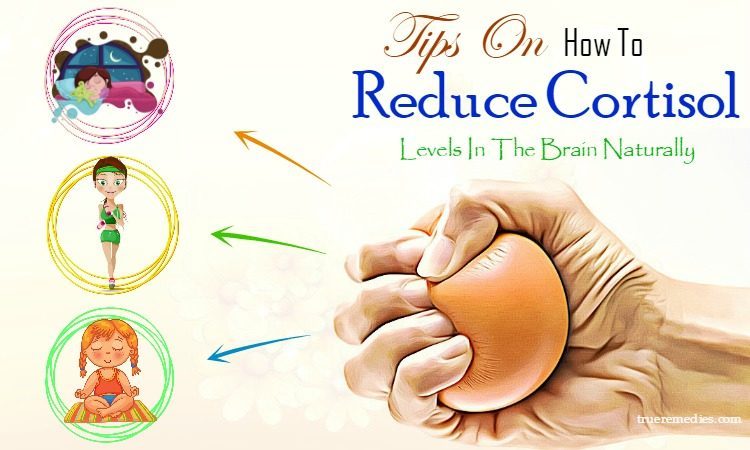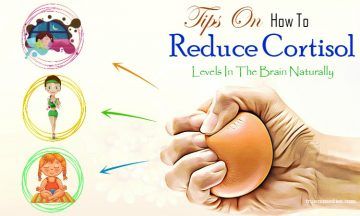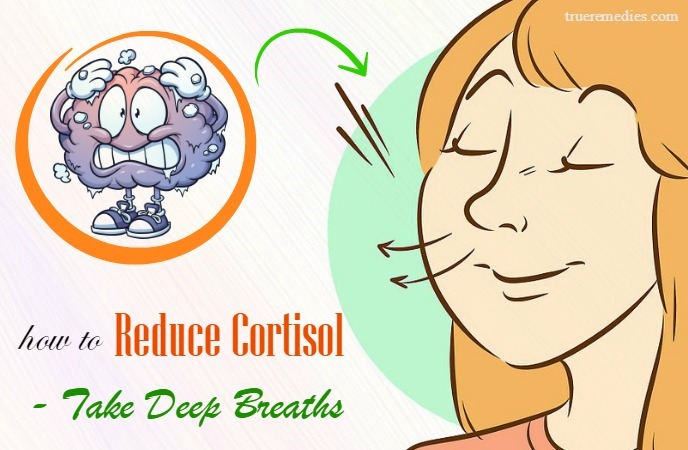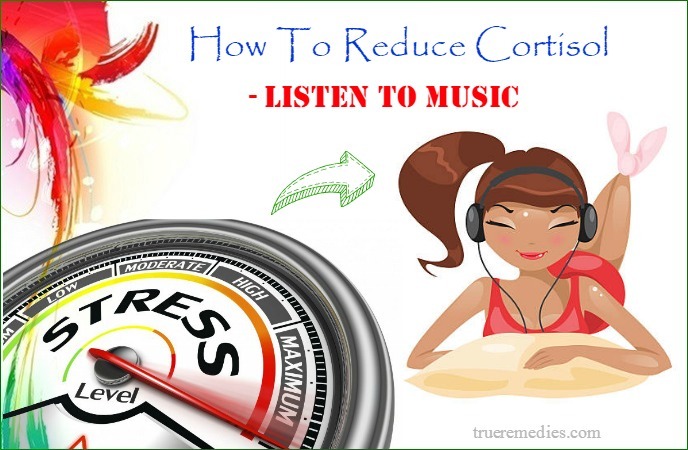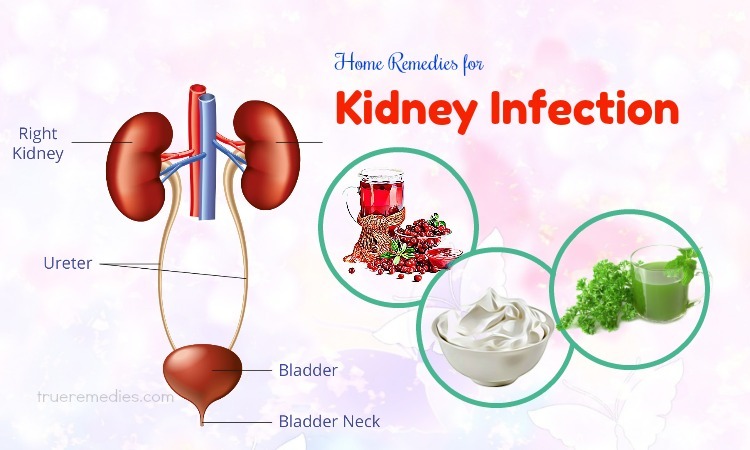Updated: 11/14/2019
Contents
Cortisol is a hormone produced by the adrenal glands, which stimulates the liver to release sugar into the bloodstream. Naturally, cortisol helps maintain balance in stressful situations and crises, also known as “fighting or running away.” However, elevated blood levels of cortisol will have a negative impact on the body and mind. High levels of cortisol can affect learning and memory, causing weight gain, high blood pressure, heart disease, depression, and psychological problems. Stress management is the most effective way to control cortisol levels. This article will give you tips to help you reduce cortisol. But first, let's find out more information about this type of hormone.
What Is Cortisol?
Cortisol is a corticosteroid hormone (corticosteroid is a type of steroid hormone – a type of natural organic compound which is synthesized by endocrine glands in the body). This hormone is produced by a part called Zona fasciculata in the adrenal cortex (the adrenal gland).This is a very important hormone and is considered a hormone that helps fight stress. It increases blood pressure and increases blood sugar. Besides, it also has the effect of enhancing immunity (anti-inflammation) and anti-allergy. In medicine, synthetic cortisol (Hydrocortisone) is used as a medicine to treat allergies (especially in anaphylaxis) and inflammation. Not only that, it is also used as an alternative to congenital cortisol deficiency. When first introduced as rheumatism medication, it is called E.Cortisol is Glucocorticoid. In addition, cortisol controls carbohydrate, lipid and protein metabolism. It is an anti-inflammatory agent that inhibits the release of phospholipids and the reduction of leukocyte activity [1].
Normally, cortisol levels rise in the morning and reach the highest level in your bloodstream at 7am. Cortisol drops very low in the evening and during the early stages of your sleep. But if you sleep during the day and wake up at night, the cortisol cycle may change. If you do not have the cortisol cycle levels during the day, you may have hyperthyroidism. This condition is called Cushing's syndrome. You should have regular cortisol tests. This test is done to check if the level of cortisol production is too high or too low. There are certain disorders such as Addison's (hypothyroidism) and Cushing's syndrome that affect the amount of cortisol produced by the adrenal glands. This test is used to diagnose these conditions and to help evaluate your adrenal and pituitary gland.
What Are Common Causes Of High Cortisol Levels?
Here are common causes of this problem:
- High cortisol levels can be caused by the use of medications prescribed by your doctor to treat certain conditions such as asthma, bronchitis, arthritis, and other inflammatory conditions. These drugs contain glucocorticoids-a steroid hormone, a hormone that is chemically similar to corticosteroids. Glucocorticoids are also used to suppress the immune system after organ transplants.
- Some types of tumors can also produce excessive amounts of cortisol. These tumors may appear in the pituitary gland, adrenal gland or in other areas.
- Physical or psychological stress can also increase cortisol levels in the blood.
- Some conditions, such as neonatal polyarthritis type 1, NAME (Nevi, Atrial myxoma, Myxoid neurofibromatosis, Ephelides) or Carney complex syndrome, can also increase cortisol levels.
What Are Common Symptoms Of High Cortisol Levels?
Here are common symptoms of this problem:
TrueRemedies Partner Solutions

Need a Help from the Leading Expert Online, Available 24/7?
They’re all here and ready to answer your questions online or by phone. Keep asking questions until you get the answer you need.
- Sudden Weight Gain
Weight gain is one of the first signs that cortisol hormones are produced excessively in the body. Weight gain is more common in the upper part of the body. When excess cortisol levels are present, fat begins to build up in parts such as the shoulders, back, and chest. However, it is notable that hands and feet do not change, but sometimes they are significantly thin.
- Skin Appears A Lot Of Problems
Increased levels of cortisol in your body will cause your skin to experience many unwanted problems. Common signs are acne, bruising, rash, and blisters on the chest, abdomen, and thighs. Not only that, hair can appear on the face and throughout the body.
- Depression And Mood Changes
Many studies have shown that high levels of cortisol can reduce the flow of blood and glucose to the brain. This will interfere with brain activity as well as increase the number of dead cells in the brain. Hence, if the amount of cortisol is high, you will be more likely to experience anxiety, stress, and mood changes. Not only that, you are very easy to fall into depression.
- Weak Immune System
Your immune system will also be negatively affected by high levels of cortisol in your body. The reason is that high levels of cortisol cause many cells to die and cause the immune system to attack the tissues of the body (instead of attacking the virus).The most common diseases when the immune system is weakened by cortisol are asthma, allergies, chronic enterocolitis, fibromyalgia syndrome, and lupus erythematosus.
- Tiredness And Insomnia
In fact, cortisol is also a necessary hormone for the body as it helps you stay alert. That is why cortisol is usually produced in the early morning to help the body function effectively. However, if cortisol is produced too much or produced at the wrong time (i.e. at night), it will cause side effects to the body, causing the body to overwork, and always feel tired.
- Other Symptoms
Some other symptoms you may encounter like skin becomes thinner; bones are very weak and easily broken; men may be impotent; frequent urination; and high blood pressure.
You may experience other symptoms not mentioned. If you have any questions about the signs of the disease, please consult your doctor.
Who Is At High Risk Of High Cortisol Levels?
High cortisol levels are a rare condition. It affects both men and women of any age. However, this syndrome is most common in women at the ages from 25 to 45. Patients with diabetes are also more likely to develop this problem.You can control this problem by minimizing risk factors. Please see your doctor for more information.
When To See A Doctor?
If you are taking medicines that contain corticosteroids to treat conditions such as asthma, arthritis or enteritis, see your doctor for a direct examination of your cortisol levels. Besides, whether you do not use the above drugs, butif you have any of these above signs or symptoms or have any questions, please consult your doctor. Each person's condition is different, so please consult your doctor to select the most suitable option.
Above's what you should know about cortisol. As you can see, high cortisol levels can cause very uncomfortable symptoms, so rapid treatment is always the desire of patients and their family members.Below, we introduce tips on how to reduce cortisol levels in the brain naturally. Take a look at TrueRemedies.com!
Top 26 Tips On How To Reduce Cortisol Levels In The Brain Naturally
1. Take Deep Breaths
This is the first tip on how to reduce cortisol levels in the brain naturally. Stress makes you breathe faster and your breathing is not as deep as it should be. When you do deep breathing, you can lower your stress levels and cortisol levels. Abdominal breathing for 20-30 minutes a day will help relieve anxiety and stress. Deep breathing helps increase oxygen flow to the brain, stimulating balance in the soul. Enhancing breathing exercises will help you connect your mind and body, and prevent stressful reactions from cortisol.
Combine deep breathing and imaginative therapy to prevent negative reactions to cortisol. Let’s imagine that you haves holes in your feet, so hot air can penetrate your body. Take a deep breath and imagine that the hot air is flowing from the holes in the leg and goes through the body. Next, relax the muscles as you breathe out, push the hot air down and out the holes. This exercise takes about 6 seconds and it is called “silent response”. This exercise helps you create harmony between body, soul and emotion through natural breathing. Breathing rhythmically also helps to eliminate tension, fatigue and anger. This is really a very useful exercise.
We would like to introduce to you another breathing exercise which also helps you to relax very well. First, let’s lie down, then place one hand on your chest and the other on your stomach. Next, relax all muscles, close your eyes and inhale slowly with your nose. Breathe deeply for 3 seconds and then exhale. You can do this exercise until you feel really relaxed.
2. How To Reduce Cortisol – Relax 12 Minutes Each Morning
This is another must-try tip on how to reduce cortisol levels. Taking a bath, preparing breakfast, getting your child to school, getting ready to go to work, and facing traffic jams every morning can make you nervous. This causes high cortisol levels to be unavoidable. So, you should relax for about 12 minutes after waking up to really rebalance your body.
Relaxation is very important, but why do you need 12 minutes to do this every morning? Research has shown that it is possible to lower the “stress hormone” cortisol level by spending 12 minutes each morning relaxing. Cortisol is usually secreted early in the morning and is responsible for maintaining the internal balance. So, after waking up every morning, instead of starting work by checking email or turning on your computer, you should make a cup of tea and sit in the sunshine to calm your soul.
3. Meditation
This remedy is one of little – known tips on how to reduce cortisol levels. Meditation is known for its ability to help relieve tension and calm the mind. The new study has clarified the relationship between meditation and stress, anxiety and fatigue reduction [2].
In addition, meditation has been found to have beneficial biochemical changes in the brain to reduce cortisol levels, increase serotonin, and increase the secretion of endorphins. Meditation produces alpha brain waves (concentrated alertness) and thetabrain waves (relaxation). All meditation activities can stimulate relaxation, help the body relax and reduce the effects of cortisol on the body.
4. How To Reduce Cortisol – Join A Yoga Class
The next treatment in this list of tips on how to reduce cortisol levels is joining a yoga class. Yoga helps to calm the mind and reduce stress levels. Research shows that yoga (even in the first yoga practice) also helps to normalize cortisol levels, bringing the balance to the body. Yoga helps relieve muscle tension, thereby neutralizing stress responses. Yoga movements help your mind really relax to feel deeply your thoughts and feelings. While doing yoga, relax your face muscles and breathe deeply and slowly through your nose to relieve stress and anxiety. Close your eyes, and stay calm for a moment to feel about everything around you. If you do not have time to take a Yoga class, you can do it yourself through the network or DVD.
The combination of yoga and meditation enhances the production of a hormone which has been shown to be effective in reducing cortisol levels and improving mental retardation. Or you can try massage. Massage is the best way to stimulate muscle relaxation, helping to support the process of soothing the body.
Learn more: Top 73 Effective Home Remedies For Dizziness, Fatigue & Vertigo
5. Walk In The Forest
This sounds strange when it comes to tips on how to reduce cortisol levels, but it works. You should take a walk in the forest or park so that the body and mind are relaxed.
Nothing can bring peace in the soul like walking in the forest and listening to the birds singing, watching the leaves fall and the little squirrel jumping among the trees. Nature brings silence and tranquility. These help you get rid of the noise of modern life. If you want to enjoy nature and relax your mind, stay away from noise pollution and leave all electronic devices at home. Do not let modern technology break the peace and quiet. If you live in the city, you can raise a pet. Playing with pets increases the levels of oxytocin, endorphins and other hormones, while reducing cortisol levels.
6. How To Reduce Cortisol – Listen To Music
The next one in this list of tips on how to reduce cortisol levels is listening to music. Listening to music when you feel stressed will affect the psycho-nervous system that will help you recover from stress faster. Listening to music or playing music stimulates the body to produce many antibodies that can attack the virus and stimulate the immune system while lowering cortisol levels.
Composing music, playing music, listening to music or expressing creativity all stimulates the production of endorphin hormones and other neurotransmitters. Music helps to reduce anxiety and depression, improve the immune system, reduce physical pain, lower your heart rate, lower your blood pressure and slow your breathing. Emotion from music also creates a sense of excitement. That’s great!
7. Plant Trees
No wonder, this one should definitely be mentioned in this list of tips on how to reduce cortisol levels. In addition to being able to enjoy self-made food, gardening and tree planting is also an exercise that helps lower cortisol levels.
Research shows that during “recovery process”, gardening significantly reduces cortisol levels and decreases acute stress. Physical activity such as gardening helps to reduce stress, relieve anger and lose weight. Known as “gardening therapy,” garden care, perception of the surrounding nature, perception and satisfaction of a well-performed job, have a significant impact on physical health because they help lower cortisol levels.
8. How To Reduce Cortisol Levels – Exercise Regularly
You should exercise daily to reduce stress. Aerobic exercise helps release endorphins, while weightlifting helps increase growth hormone, which helps prevent and control cortisol hormones. Aerobic exercise helps reduce stress, lower high blood pressure, regulate blood sugar levels, and maintain healthy weight. Weightlifting helps increase muscle mass, increase serotonin and dopamine. These chemicals help to reduce stress and depression. Besides, you can use DHEA supplements to boost muscle growth, boost strength, and increase motivation [3].
Note that you should avoid excessive exercise. You should only exercise for 30-45 minutes to maximize cortisol control.After exercising, you also need to take care of your body by eating carbohydrate and protein foods to regenerate glucose and nitrate levels, helping to restore normal cortisol levels faster.
Read more: 13 Tips On How To Balance Hormone Levels Naturally At Home
9. Take More Time To Rest
This is the next treatment in this list of tips on how to reduce cortisol levels. If you spend all your time to work, you will hardly have time to take care of yourself. So, try to arrange yourself a flexible work schedule. This will not make you feel overwhelmed. Also, go to work early and use plenty of time at noon to take a break. This will help you work more effectively in the afternoon. Spending more time relaxing is actually an effective way to reduce cortisol levels in the body.
10. How To Reduce Cortisol – Establish Social Relationships
Establishing social relationships is the next remedy in this list of tips on how to reduce cortisol levels. Compared to the extrovert, introverts are more susceptible to cardiovascular health.
Some studies have suggested that loneliness is a more serious concern than smoking. Therefore, join a club, fitness class or volunteer activity to force yourself out of the house. Volunteering helps you feel better (both physically and mentally).In addition, you should go out with friends or colleagues after work. Meeting and chatting with your friends of family members helps to create a more positive mental attitude.
11. Create A Relaxing Environment
Creating a relaxing environment is another must-try treatment in this list of tips on how to reduce cortisol levels. You should create a quiet environment to feel relieved when you return home after a busy day. Also, be wary of situations that are chaotic, disorganized, or conflicting, which makes you nervous. Instead, look for places to create positive feelings.
Place fresh flowers on the table, near the walkway and in the bedroom to soothe the atmosphere. Using aromatic candles also helps to create a sense of peace and relaxation. Natural sunshine is not only good for the body but also good for mental health. Therefore, pull the curtain and let the sunlight into the room. Sunshine creates a sense of warmth and happiness. In addition, you need to regularly clean the house. The messy house will create chaos and disorganization.
12. How To Reduce Cortisol Levels – Get Enough Sleep
This remedy is one of little – known tips on how to reduce cortisol levels, but it is effective. If you want to regulate and reduce cortisol levels in your body, you need deep sleep and plenty of sleep, at least 8 hours a day. Sleep affects your appearance, quality of work and overall quality of life as well as your longevity. Therefore, getting enough sleep is a very important step [4].
13. Do Not Consume Caffeine
The next treatment in this list of tips on how to reduce cortisol levels is not to consume caffeine. Do not drink too much coffee. Although it helps to reduce stress and enhances your concentration, caffeine increases cortisol levels by up to 18 hours after you take it. A cup of coffee (350 ml) contains 200 mg of caffeine. This amount of caffeine increases the cortisol level by 30% within one hour. Removing caffeine from the diet is the fastest way to reduce catabolic metabolism and increase anabolic metabolism. Consuming too much caffeine (more than 500 mg a day) can cause headaches, restlessness and anxiety. This will increase corticosteroid levels and negatively affect sleep habits. So, not drinking coffee helps to save money and control cortisol levels. Caffeine drinks include coffee, soda and tea.
14. How To Reduce Cortisol – Quit Smoking
Smoking causes many negative effects on the overall health of your body and those around you. In addition, smoking also increases the body's cortisol levels abnormally. Therefore, stop smoking or at least limit this. Your body will thank you if you do so.
15. Increase Vitamin C Consumption
This sounds strange when it comes to tips on how reduce cortisol levels, but it works. Vitamin C is an antioxidant that strengthens cell membranes and supports immune cell function and collagen synthesis. These protective effects of vitamin C will help you fight stress. The addition of 1000 mg of vitamin C daily significantly improves the ability to normalize adrenal cortisol secretion. Vitamin C is rich in many fruits such as oranges, lemons, grapefruit, tomatoes, broccoli, and peppers. In addition to vitamin C, there are several synthetic vitamins which are able to reduce stress, including vitamins B1, B5 and B6. They also help normalize cortisol levels.
Some minerals, such as magnesium and zinc, also significantly reduce cortisol levels after you exercise. In addition to reducing stress and controlling cortisol levels, these supplements also boost the immune system. Therefore, let’s add these vitamins and minerals to your body to gradually improve your condition.
16. Do Not Take Soy Products
No wonder, this is definitely one that should be mentioned in this list of tips on how to reduce cortisol levels. Soy products can cause inflammation and bowel obstruction. This is also the cause of many different hormone problems, including high cortisol levels. So, if you want to balance the hormone properly, you should limit consuming soy products.
17. How To Reduce Cortisol Levels – Supplement Melatonin
This is the next one in this list of tips on how to reduce cortisol levels. Melatonin is the natural hormone that the body produces at night to regulate the wake / sleep cycle. Before going to bed, you can increase your melatonin levels by taking functional supplements to ensure your sleep lasts at least 8 hours. Although clearly recognizing the relationship between melatonin and the body, its effect is not the same for everyone. So, you need to consult a doctor before you want to take melatonin supplements.
18. Regulate Blood Sugar
You should limit your intake of refined carbohydrates and sugars to limit your insulin secretion. Instead, you should eat small meals full of protein, complex carbohydrates and healthy fats such as olive oil and flaxseed oil. These foods help lower cortisol levels. Glucagon is produced at night when you sleep and between meals. You need to control this hormone to regulate blood sugar and balance energy. When imbalanced, cortisol will be produced to increase blood glucose levels.
In addition, you should also carry water with you to regularly provide water to the body. The lack of water also increases the cortisol levels in the body. Dehydration causes fatigue, which reduces blood flow to some internal organs. Therefore, let’s maintain the habit of drinking 2 – 2.5 liters of water per day. This is really good for you.
19. Use Of Corticosteroids To Treat Adrenal Failure
If you are diagnosed with Addison's disease or another disease in the adrenal gland, your doctor will advise you on appropriate treatments. Addison's disease can be life-threatening if it is not treated. It can also lead to acute adrenal failure. Here are some treatments that you should apply:
- Take corticosteroid. Hydrocortisone, prednisone or cortisone acetate can be administered orally to replace cortisol.
- Receiving corticosteroid injections if you are in an emergency. If you vomit and cannot swallow the medicines, or if you are in an emergency like acute Addison's disease, you can receive corticosteroid injections.
- Always carry the medicine with you. Forgetting to carry the medicine can lead to serious consequences. So, you should put the medicine in your purse, handbag, and suitcase when you travel.
- Consider wearing a warning bracelet and a sick sign in your wallet. Severe cortisol disturbances can cause you to lose consciousness. In that case, the alert bracelet will help the health worker identify the cause faster to help you in a timely manner.
20. How To Reduce Cortisol – Acupuncture
This method is trusted for thousands of years in traditional Chinese medicine. It involves applying proper pressure to specific points in the body to get positive results in body functions or organs associated with acupressure points. Its benefits include controlling stress and reducing symptoms such as headaches, joint pain, troubling sleeping, poor blood circulation and fertility issues [5]. By decreasing stress, acupuncture assists you in lowering cortisol levels.
21. Plan An Anti-Inflammatory, Whole Foods Diet
Diet also plays an important role in controlling cortisol levels. Poorly managed blood glucose levels and high inflammation levels could trigger high cortisol levels along with other hormonal imbalances. Therefore, planning an anti-inflammatory diet, which contains less or even no processed foods and more antioxidants, essential nutrients and fiber, is key to hormone balance. These strategies also help with your weight loss goal, energy and sleep improvement.
Some important dietary contributors to high cortisol levels and inflammation are:
- High amounts of trans or refined fats
- High-glycemic, high-sugar diet
- Lack of antioxidants and micronutrients
- Drinking too much alcohol and caffeine
- Lack of fiber, healthy fats and protein
You had better switch to a low-glycemic diet which consists of proteins and healthy fats with all meals. Warrant that you also get adequate fiber as well as phytonutrients through eating fresh fruits and vegetables [6].
some examples of helpful foods for stress hormone reduction include fruits, veggies, olive or coconut oil, nuts, lean proteins (such as eggs), seeds, grass-fed beef, probiotic foods (such as cultured vegetables, kefir or yogurt) and fish.
22. Use Adaptogenic Herbs
According to studies, adaptogenic herbs have positive effects on the human body, including antiviral, antibacterial, antidepressant, antioxidant, and anti-fatigue. These herbs have been used for thousands of years in treating many conditions, including increased cortisol levels. They do it by balancing different hormones in the body. You can take advantage of these herbs in the tea form to reap their benefits. Many adaptogens are also available in the powder or capsule form. Some types like holy basil could be grown or purchased in fresh plant form to use in foods and drinks.
Here are some of great adaptogen herbs for lowering cortisol levels:
- Gingko Biloba: Gingko biloba is heavily researched supplement for its ability of lowering cortisol. This extract was used in Chinese medicine for a long time ago [7] to treat a number of illnesses including improving memory, alertness and energy, sex drive, blood flow, etc. For the stress hormone – cortisol, it blunts the cortisol’s effects in two ways. The 1st is that this herb slows down the conversion of cholesterol to cortisol in adrenal glands due to the extract ginkgolide B. The 2nd is that, as ginkgolide B reduces the release of corticotrophin releasing hormone (CRH) by hypothalamus, it reduces the release and conversion of cortisol.
- Holy Basil: This herb is also called as tulsi and has a powerful anti-inflammation property. Benefits of holy basil have been proven in Ayurvedic medicine to handle a host of conditions like skin diseases, infections, hepatic disorders, cough, common cold, malarial fever, scorpion sting and snake bite [8]. The reason why holy basil is listed in this series of natural ways on how to reduce cortisol levels is the availability of 3 phytochemical compounds, namely ocimumosides A and B and 4-allyl-1-O-beta-D-glucopyronosyl-2-hydroxybenzene [9] [10] [11]. These compounds have anti-stress effects and might lower corticosterone (a stress hormone) can give positive alternations in the brain’s neurotransmitter system.
- Ashwagandha: This herb is often referred to as Indian ginseng. The effects of ashwagandha on cortisol have been well studied for a long time. In fact, this herb helps with not only stress, but also many types of tumors, inflammation, arthritis, brain health, cognition and memory.
- Astragalus root: Often used in Chinese medicine, astragalus has been proven to improve immunity and buffer the impacts of stress. It might temporarily boost cortisol levels in order to help the human body to positively respond to specific kinds of stress. This temporary strike of cortisol will let the hormone level out right after the stress has been eliminated.
- Licorice Root: Using licorice root can boost endurance and energy, improve the immune system, and so on. Supplementing with this herb will assist you in regulating hormones associated with stress, such as cortisol [12].
Other great adaptogen herbs for cortisol control are cordycep mushrooms, rhodiola, and panax ginseng.
23. How To Reduce Cortisol Levels – Have Sex
Well, this sounds too obvious, right? A study carried out by the experts at the Cornell University found that casual sex is very good for both the mind and body. It reduces stress significantly and keeps you looking as well as feeling younger from inside out.
24. Stop Endurance Training
Depending on the type and intensity of exercise, it could increase or decrease cortisol levels. Endurance exercises will trigger your cortisol levels to increase dramatically. If you always exercise hard, your stress hormone will be high. Choose moderate exercises instead. The mild to moderate exercise at just 40 to 60% of the maximum attempt does not lift your cortisol temporarily, and still lower it afterwards.
25. How To Reduce Cortisol Levels – Use Essential Oils
Rather similar to adaptogen herbs, essential oils can also fight off stress and balance hormones. Some examples are clary sage, lavender, bergamot, frankincense, etc. They have active, potent ingredients which have been shown to lower cortisol, defeat anxiety, improve immunity, decrease inflammation and promote sleep as well as digestive functions naturally [13] [14].
You can inhale essential oils, have bath soaks, diffuse them in the house, or rub them directly over your skin when mixed with your chosen carrier oil (like jojoba or coconut oil).
What is more, high levels of cortisol also cause some adverse effects like indigestion, acne, and bloated stomach, some types of essential oils like peppermint or lemon oil can help with such problems, too.
26. Talk To Your Doctor About The Medications You Are Taking
The next way on how to reduce cortisol levels in the brain naturally is sincerely consulting your doctor about your medications. As we mentioned above, the use of certain drugs to treat certain conditions such as asthma, bronchitis, arthritis, and other inflammatory conditions can cause high cortisol levels. Therefore, you should talk to your doctor about this for proper treatment. Your doctor may prescribe alternatives to your medications, or medications that help improve your condition.
Cortisol is a critical hormone for the human survival. Nonetheless, chronically high levels of cortisol will result in a variety of symptoms and illnesses. Luckily, you could naturally lower your cortisol levels by following some of 26 tips above. As you can see, they are all very safe and simple. Therefore, let’s choose and apply some of them to see how effective they are. If you have any contributing ideas about our article of “Top 26 Tips On How To Reduce Cortisol Levels In The Brain Naturally” introduced in How To Category, do not hesitate to drop your words below this post. We will answer as soon as we could.

